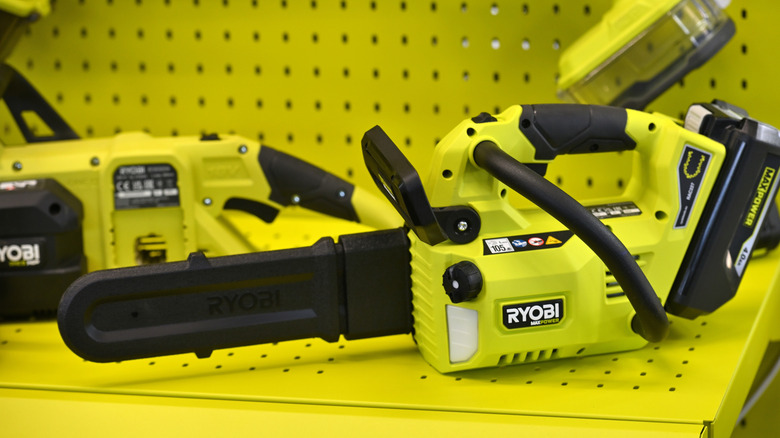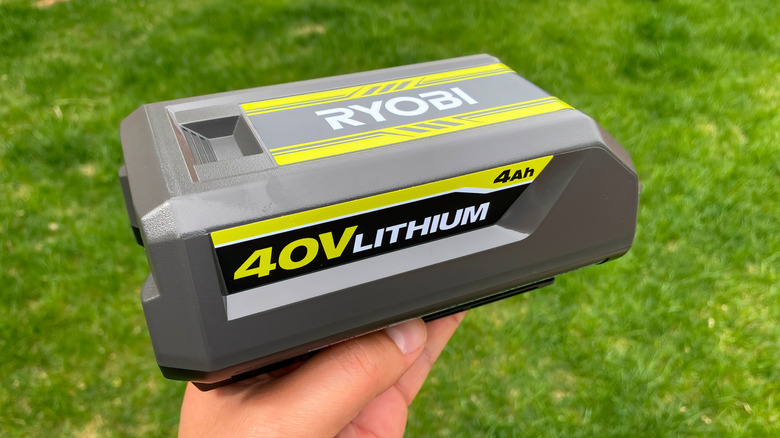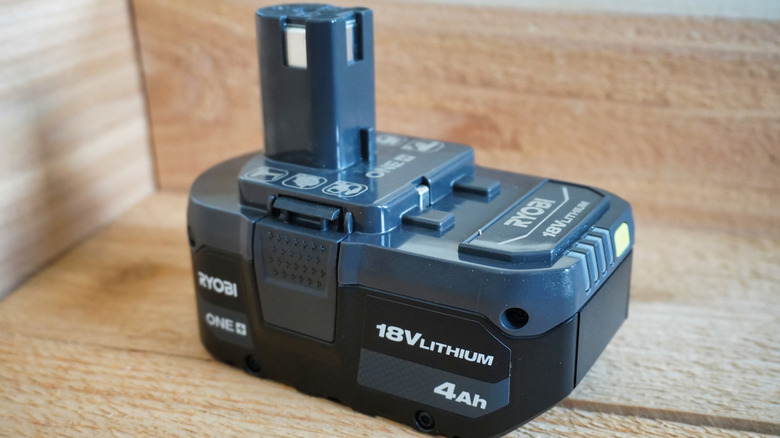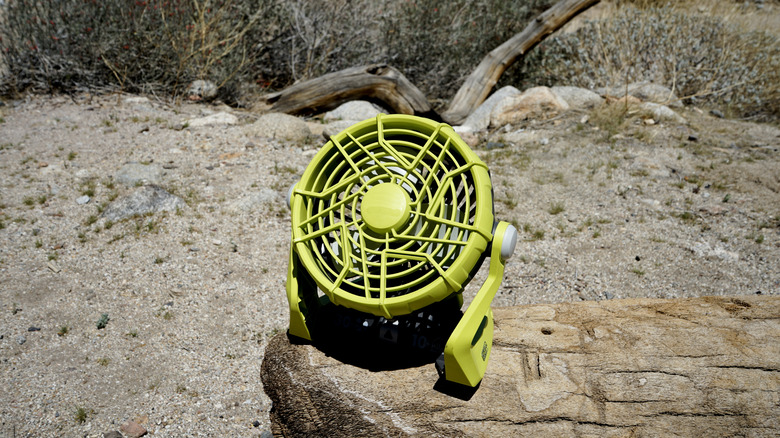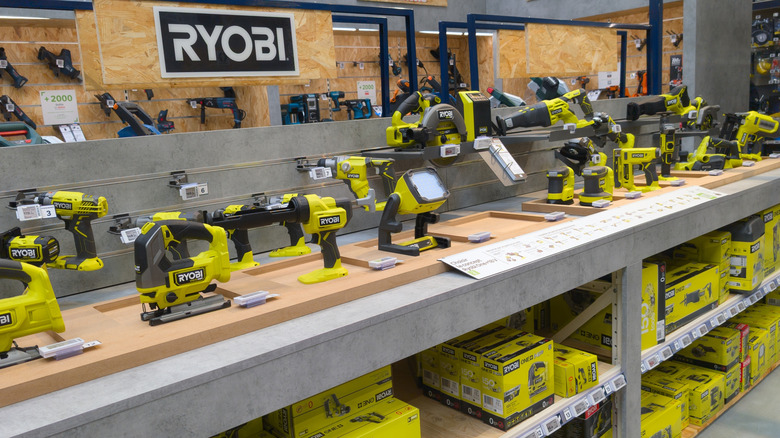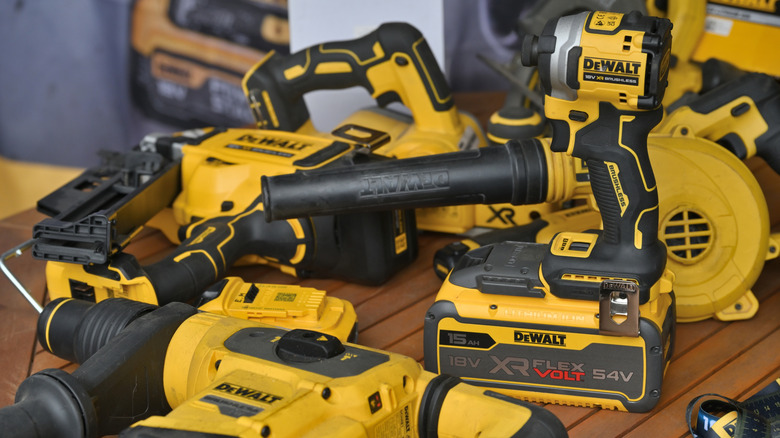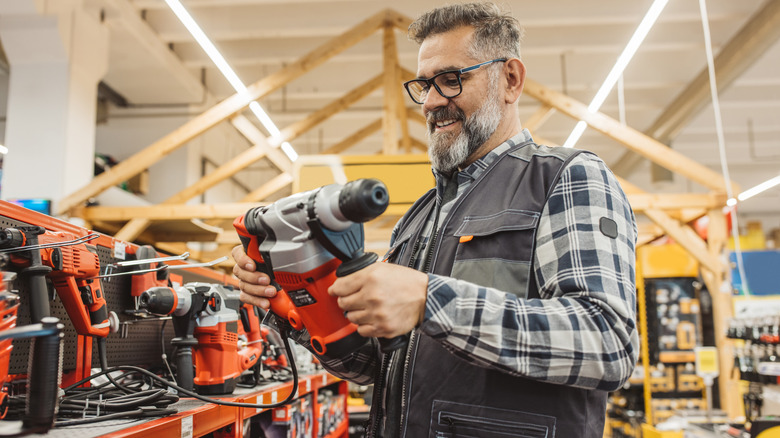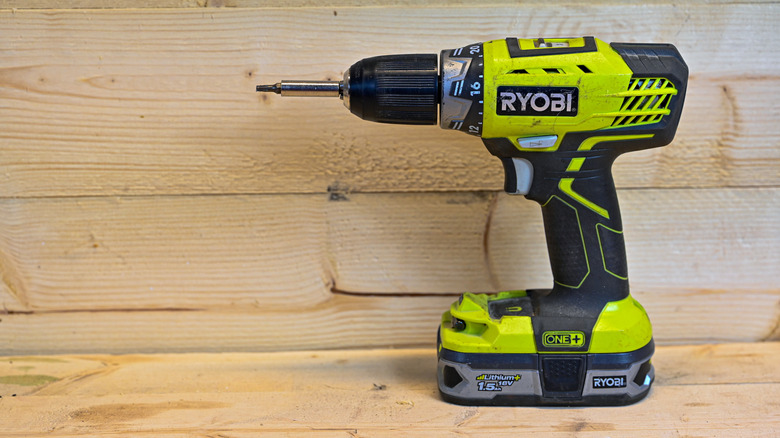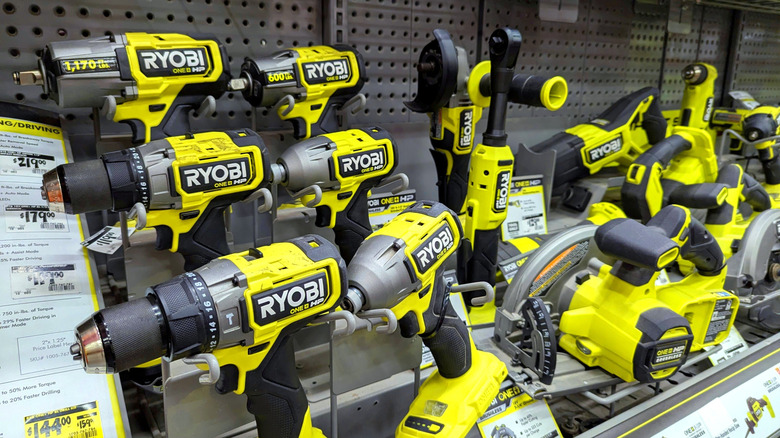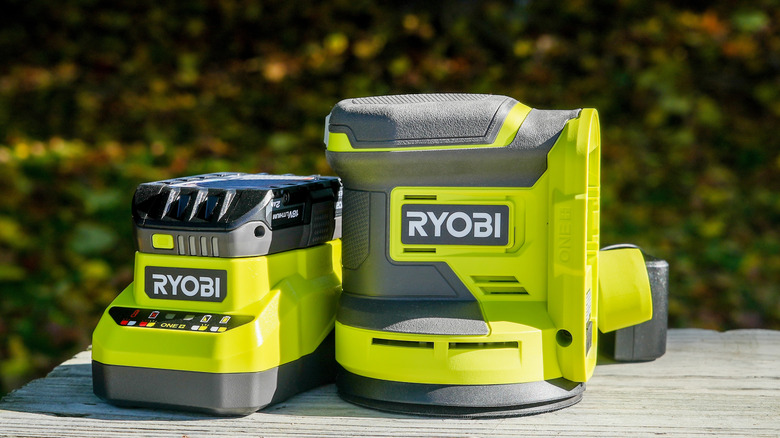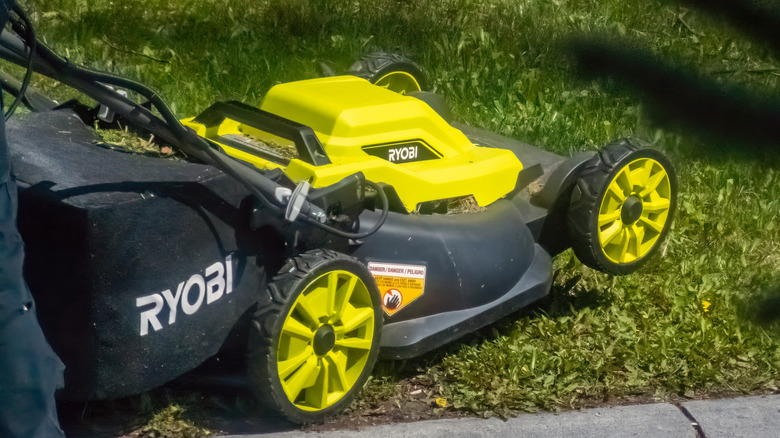13 Things To Consider When Buying Ryobi Tools
Ryobi has far more to offer than just tools. The brand's growing suite of appliances for homeowners covers everything from cleaning and yard maintenance to recreation and household DIY. This means that if you need a drill to put up the fence, a mower to maintain the grass beneath it nice and trim, and a music speaker to keep yourself motivated, you're likely to find what you need with Ryobi. However, depending on your needs, there are certain Ryobi tools that customers say aren't worth buying, and even if they are suited to your needs, there are still some considerations worth bearing in mind before you go ahead and start building your collection.
The range is extensive, featuring no fewer than four battery systems, which means that you'll need to weigh up the cost of equipping yourself with tools from different tiers of the Ryobi ecosystem. With that in mind, you might be surprised by how little you actually save by buying Ryboi, even compared to more premium, trade-approved brands. It's also possible to find better deals (and better quality tools) within the wider "prosumer" category, and while an association between the Ryobi brand and poor quality tools may, nowadays, be out of date, there are many Ryobi users who continue to experience issues with build quality. In other words, while it's certainly possible to source toolbox essentials from Ryobi and save a serious bucks in the process, if you're thinking of diving headfirst into the brand's collection of tools, it could pay to dip a toe in first and assess the temperature.
Not all Ryobi batteries fit all Ryobi tools
An attractive proposition for anybody yet to start their collection of tools is the ability to pair a wide selection with a single type of battery. That's certainly possible with Ryobi, but only if all of your chosen tools come from the same battery ecosystem. In fact, Ryobi has four battery systems: USB lithium batteries, 40V Max Power Batteries, 18V ONE+ Batteries, and 80V batteries.
This means that if you need extra power to keep you on track as you work your way through your weekend to-do list, you may need to source several spare batteries. For example, if you have a large garden and decide to opt for garden tools from the brand's more powerful 40V or 80V ranges, you'll need dedicated spare batteries to keep them running. This isn't an issue in isolation, but if you also have power tools from Ryobi — almost all of which run on the 18V ONE+ battery system — you'll also need to source spare batteries for those.
With all of that said, the line-up of batteries needn't be a reason to avoid Ryobi. If your gardening needs are only lightweight and you can get the job done with its 18V ONE+ range of "Outdoor Power" tools, then great. The brand currently has 129 18V ONE+ Outdoor Power tools, plus 230 power tools that use the same battery system, making it easy to match batteries to a wide array of tools.
Not all Ryobi batteries will fit the same charger
If you're new to the world of Ryobi, then matching batteries to chargers is relatively straightforward. And regarding the previous consideration about the brand's different battery systems, anybody with a mixture of 18V and 40V Ryobi tools can buy a Dual Platform Charger to keep batteries from both systems duly juiced. However, if you're an old-hand when it comes to Ryobi and are considering upgrading your old tools for some newer models, you may well need to add to your expenditure by purchasing an up-to-date charger.
As Ryobi itself explains, its older chargers (those which are often gray or black in color) were designed before the advent of Lithium batteries. Those newer tools that you've been eyeing on the Ryobi website all use Lithium batteries, which are simply not compatible with older charging units. This isn't necessarily a bad thing, not least because lithium batteries come with a range of benefits, including lighter weight, lower maintenance, and crucially, a longer lifespan and faster charging. However, if your shed is fully equipped with old Ryobi gear — chargers and all — you'll need to keep hold of those for any old tools that you don't yet plan to replace, while sourcing new batteries and chargers for your new models.
Some Ryobi batteries can be used for more than just tools
There are plenty of Ryobi tools that make work in your home and garden a breeze, and while the growing range of batteries and tools makes interchanging between them increasingly tricky, it's also worth bearing in mind that some batteries can be used for more than just tools. The brand's USB lithium batteries, for example, come with in-built USB ports for convenient, on-the-go charging, while also serving to power a range of tools that are built for Ryobi's smallest battery system.
Rotary tools, power carvers, screwdrivers, glue and nail guns, chemical sprayers, and shear shrubbers are just some of the Ryobi tools that use the USB lithium battery. Outside of gardening and DIY, Ryobi also has a line-up of recreational gear, including USB lithium-powered misting fans, speakers, and inflators. And in the brand's 18V and 80V range, there are power solutions to cover more than just tool work, including an 80V 1000W portable power source, which is great for families on the road who want to avoid the dangers of child boredom by keeping their devices topped up.
Ryobi tools aren't designed for heavy use
This entirely depends on how heavy your tool use is likely to be. However, many users on Reddit with experience of Ryobi tools agree that they're generally geared towards home owners and DIYs, and that they won't necessarily hold up for rigorous, daily use by tradespeople. There is nothing inherently wrong with this, and if you need power tools for occasional jobs like assembling furniture, mending the fence, or trimming the lawn once a week, then you may well find that they are tough to beat for the price point.
Just know that, for heavier, more frequent use, more premium name-brands like DeWALT and Makita may be more suitable. As one Redditor says about Ryobi tools, there's "Nothing directly wrong with them." They liken the comparison between Ryobi and more premium brands to that between Hyundai and Lamborghini. In other words, Ryobi tools are likely to be fine for most home DIYers, but there are better brands to shop from for users who intend to use them more heavily and frequently. One user describes Ryobi tools as cheap and disposable (which, believe it or not, is the reason that they like them), while two suggest that Ryobi's product warranty may be impacted, or even voided, if certain products are used for professional purposes. In fact, Ryobi's Guarantee Conditions state that only products purchased for private use are covered, and that professional users are expressly excluded.
Ryobi tools could help you save vs premium name brands, but not always by much
For the most part, Ryobi tools tend to edge out other name brands when it comes to cost. It's one of the many reasons the brand is so popular. However, it is possible to find some good deals even among higher-ranked power tool brands, some of which, arguably, offer more "bang for your buck" than Ryobi.
For example, Ryobi's highly-rated 18V One+ Brushless ½" Drill/Driver Kit — which features two batteries, a charger, the tool itself, plus a bag — currently retails for $159. That's not bad, however, over at Walmart, it's possible to secure a similar product from DeWALT, known for its premium-quality tools, for $219. That sounds like a significantly more pricey tag, however, the DeWALT 20V MAX Cordless Drill/Impact 2 Tool Combo Kit, as the name suggests, features two power tools: a ½" Drill/Driver with 20V of power (that's more than the Ryobi version), plus a ¼" Impact Driver. It also comes with a carry bag, plus two DeWALT batteries (one per tool), and a charger.
Now, the Ryobi tool is brushless, and the DeWALT option isn't. However, if you're using your tools for occasional home and DIY use, you may not need a brushless motor. What's more, with DeWALT, you have a dedicated impact driver for working with tougher materials like hardwood, and the drill/driver for less hardcore applications, meaning you can use the appropriate tool for the job, and thus minimize the risk of wearing either one out.
Other budget-friendly brands might be better for prosumers
Ryobi isn't the only player in the world of budget-friendly power tools. Hercules, one of several brands owned by Harbor Freight, is another strong contender for those who need powerful reliability without breaking the bank. This is a frequent assessment over on Reddit, where some say that, despite Ryobi's suitability for more occasional jobs, Hercules tends to win out for those that require reliable power.
One Redditor speaks highly of Hercules drills, saying that it's way ahead of Ryobi for "prosumers" — non-professionals who still want tools that are up to professional standards. Another, who admits that Ryobi's 18V One+ line-up is hard to match, nevertheless says that Hercules tools are, generally-speaking, better than those made by Ryobi. It's not that Ryobi tools are bad, per se. It's just that you might find Hercules (or, indeed, other budget brands) better suited to the job than Ryobi equivalents. Other benefits, it seems, are Hercules' reassuring five-year tool warranty, which Ryobi only offers on 80V tools and batteries, as well as on 40V tools (not batteries). If you'd prefer not to definitively pick a side, one Redditor advises, "Don't get out of Ryobi, just buy Hercules for anything that you need a new or better version of."
Users cite issues with Ryobi battery lifetime
This really depends on where you live and whether you're able to keep your Ryobi tool batteries stored in a cool place. While some say that Ryobi batteries are poor, and that their lifetime doesn't add up to what they cost, feedback from users on Reddit is generally praising, with many citing long lifetimes and consistent reliability. In fact, there are some who say that they've not experienced a single Ryobi battery failure in more than six years.
The issues that users seem to run into occur when batteries are frequently exposed to cold or high heat. In busy shops in hot regions, this may be unavoidable, especially if you need to keep your tools on-hand and can't afford the time it would take to keep going back and forth to a cooler storage room. However, since Ryobi itself says that storing its batteries in areas with extreme temperature fluctuations can lead to a reduced lifespan, it's important to consider how you'll store yours in order to ensure longevity.
Not all Ryobi ranges are created equal
All Ryobi "Power Tools" form part of its 18V ONE+ ecosystem. This means that prosumers can get an awful lot of work done with just one type of charger and battery. However, that doesn't mean that all power tools offer the same "oomph."
Take Ryobi's range of drills as an example. There are several products in this category, including half-inch drill/drivers, available in both "brushed" and "brushless." Per Ryobi's own comparison, brushless drills out-perform brushed versions, which it says translates across all tools that are available in both types. So, which one should you buy?
To determine which is best for your needs, you should consider how, and how often, you'll use it. If you only need to perform occasional jobs around the house, then a brushed tool will be fine. However, if you're undertaking a large project like a home renovation, or have another heavy-duty project penned in for the future, then brushless would be your best choice. As Kenny Koehler at Pro Tool Reviews says, when you move into the brand's high-end brushless tools, "you get the best of everything Ryobi has to offer."
An association of the brand with poor quality tools could be out of date
Reading reviews across platforms like Reddit, it becomes clear that, while some still cite issues with Ryobi, the brand's broadstroke association with poor-quality tools could well be out of date. Sure, there are plenty who agree that, once upon a time, the brand's offering was decidedly lower quality than others in the market. But many of those same contributors now believe that it has raised the bar, that there are plenty of Ryobi tools worth buying, and that even professionals can equip themselves reasonably well on a budget.
Many agree that it's now a perfectly acceptable brand as far as quality goes, especially for tools that will only be called upon occasionally. However, a number of contributors caveat this by saying that Makita or DeWALT may be better for daily, heavy-duty use. Ultimately, as one person on Reddit says, "Ryobi has made some poor-quality items in the past, but there's at least a decent version of everything at this point (often in the brushless line), and some of the tools are excellent."
Some users cite issues with product ergonomics and precision
Another common thread in user reviews of Ryobi tools is that, while they are reasonably (sometimes very) well-built for the price point, they are often lacking in terms of both ergonomics and precision. Some suggest that certain tools vibrate more during use than those made by big-name brands, making them less comfortable to use for larger projects. Others suggest that there are certain types of Ryobi products that should be avoided, specifically those which are designed to cut. One describes how their Ryobi jigsaw vibrates so much that it's hard to keep it straight — far from ideal for a task that requires precision.
Of course, it's important to remember that these are the opinions of individual users. As one Redditor rather reasonably puts it, "What's best is subjective." However, they are inclined to agree that while Ryobi offers great value for money, "many tools they make lack in ergonomics, precision and general build quality compared to the more professional brands."
It's important to check your equipment's warranty
Depending on which Ryobi tool and battery ecosystem you buy into, you should make a point of checking your equipment's warranty. While some, like the brand's 80V batteries, come with a five-year battery warranty, the 18V ONE+ batteries and tools come with just three. All USB lithium batteries and tools have a two-year warranty, and while 40V tools boast a five-year tool warranty, the 40V batteries come with just three.
Regardless of how much money you're saving by buying more budget-friendly tools, you'll want to know that your purchase won't be let down by the warranty. With that in mind, you may find that other manufacturers offer greater peace of mind. Hercules, for example, offers a five-year warranty on all brushless tools purchased after August 19, 2022. So, if you're thinking of going brushless with Ryobi — and you're not already totally invested in the Ryobi ecosystem — then it could be worth buying Hercules instead. Just bear in mind that Hercules' five-year coverage is provided for brushless tools only, and that for brushed tools, it offers just 90 days (plus the option to purchase up to an additional two years). Ryobi tools, meanwhile, benefit from the same warranty — brushless or otherwise.
Ryobi's 18V One+ lawn mowers may not be worth buying
Once again, this is really dependent on your specific needs. However, customers on Reddit with experience of Ryobi's 18V ONE+ "Outdoor Power" range suggest that you might simply be better off going up a tier and opting for a 40V tool instead. Users there suggest that the 40V products, including lawn mowers, handle the resistance of larger lawns much better than their 18V siblings. And if you're trading in your old gas mower for an electric alternative, one contributor suggests that the best rule of thumb is to opt for at least 40 volts, saying that they personally own a 40V Ryobi self-propelled mower and that they absolutely love it.
Another user suggests that it's not strictly necessary to buy a 40V mower, however, they do agree that other outdoor tools from the 40V range are superior to those with 18V batteries. As they put it, "You don't NEED 40V. But if you plan to buy any additional outdoor equipment, I'd go for the upgrade. Leaf blowers, pressure washers, trimmers, chainsaws etc are all MUCH better on 40 vs 18V."
Users describe issues with easily-broken drill bits
If you're planning to go all-in and source absolutely everything from Ryobi, then you'll have a choice of an incredible array of tools to cover all DIY eventualities. However, you should know that many users cite some serious issues with the brand's consumables, and more specifically, its drill bits. These include one Redditor who explains that, having tried them and discovered them to be low-quality, they now refuse to buy them again. Another agrees, explaining that the varying temperature of their garage was enough to make the bits warp, and one even says that, despite applying next to no pressure, they managed to break three Ryobi bits the first time they ever used them.
Now, the quality of the bits alone is no reason not to shop the wider Ryobi range. Instead, try to live by a motto that one user describes as "cheap tool, nice blades." In other words, save yourself some money on your power tools, but try not to skimp on the bits. As another Ryobi customer says, "Using a premium bit will take your tool to the next level."
